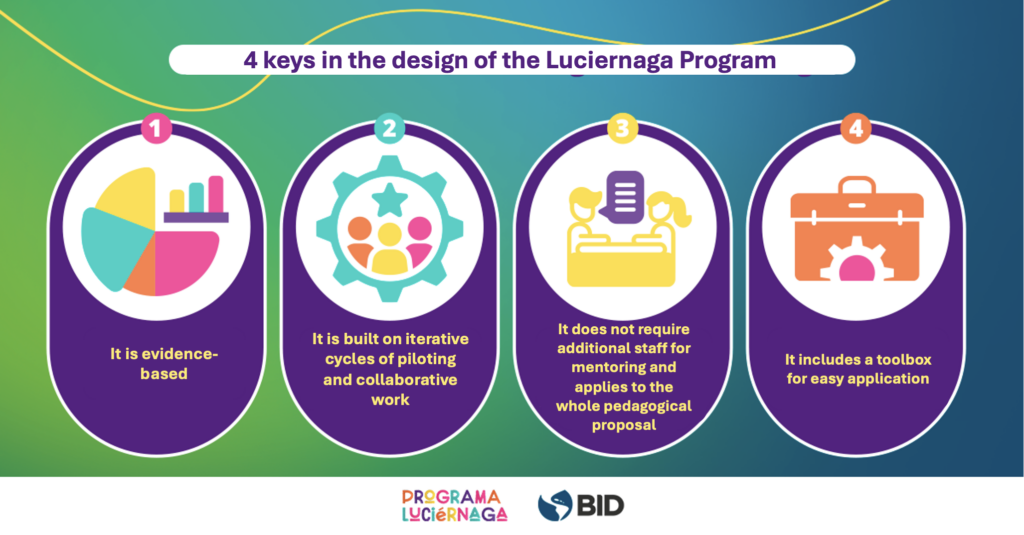We know that investing in childcare is key to the future. But, when it comes to early childhood services, it is not only a matter of investing in coverage, infrastructure, equipment or the pedagogical model: it is also necessary to invest in the quality of interactions – that is, in interactions that are warm, rich in language and responsive to the child’s needs and interests. How to design a tutoring program that contemplates this?
When the Mexican Social Security Institute (IMSS) verified, based on the results of a study, that its centers showed room for improvement in the quality of interactions, it decided to take action and invest in the training of its teams. Thus “Luciérnaga” was born: a mentoring program for educational agents working with children up to 3 years of age.
In this blog, we tell you four keys to Luciérnaga’s design.

1. Working from need and evidence
Evidence plays a fundamental role in the development of successful public policies, as it allows informed decisions to be made rather than relying on intuition. In this sense, the study conducted in Mexico was key to defining how to improve the quality of interactions in child care centers: it motivated IMSS leaders to explore solutions, with a requirement to work with existing staff.
The first solution was an online course on quality interactions, which helped raise awareness among educators about the importance of maintaining quality interactions. However, it became clear that in order to modify and strengthen the practice – the work in the classroom – it was necessary to incorporate mentoring as an in-service professional development model. In this way, the mentors would observe the educational agent’s practice and provide feedback for continuous improvement. To this end, Luciérnaga was designed with reference to successful mentoring programs: Practice-Based Coaching in the USA, Un Buen Comienzo in Chile, and Cerrando Brechas in Ecuador. A group of experts from these experiences accompanied the initial construction phases.
2. Building on piloting cycles and collaborative work in the field
Starting with a first design in 2021, intensive collaborative work was carried out with the IMSS technical team at the central level and with educators from 16 care centers throughout the country. Three iterative cycles of prototyping-piloting-adjustment were carried out, each lasting two months. In each cycle, qualitative and quantitative information was collected and analyzed to adjust the design of the next cycle.
As a result, a curriculum was developed consisting of 12 practices that every educational agent is expected to master by the end of the mentoring program, as well as the Luciérnaga implementation methodology, which is based on cycles of planning, observation, and feedback. As it is built with the people who implement it, Luciérnaga responds to the reality of the center, which makes it robust.
3. Work with the center’s own staff and implement the proposal for all children from 0 to 3 years of age
The mentoring role is performed by someone from the center, who also continues to perform her other responsibilities. The mentor is trained by a facilitator in a hybrid model that includes initial face-to-face training and synchronous remote sessions.
Luciérnaga is applicable to any proposal for the care of children from 0 to 3 years of age. Its implementation does not require additional pedagogical planning to those already carried out in the centers, but its focus is on how to do it and on the interaction with the children in the room.
4. Have a toolbox to facilitate the application
Based on the results of the pilot, the materials that make up the Luciérnaga “Toolbox” were developed: a kit containing the ABCs for the implementation of the program with specific and differentiated materials for educational agents, mentors and facilitators. It includes, among others, the mentoring manual, 12 worksheets with the prioritized practices and the steps to implement them, explanatory videos on how to carry out the mentoring and how to execute the prioritized practices, and resources for the continuous training of mentors. These inputs can be easily adaptable to other programs.
Will We Be Able to Expand the Luciérnaga Program?
Currently, in collaboration with Proyecto DEI, we are conducting an impact evaluation of Luciérnaga in 78 IMSS centers to understand how to scale the program. Based on the results of this exercise, we will improve its contents and implementation proposal.
In the medium term, we hope to implement Luciérnaga in many other centers to further improve the quality of interactions and contribute to closing gaps in child development.
Stay tuned to learn more about Luciérnaga and its protagonists!
This project is financed by the Early Childhood Development Innovation Fund, a partnership between the Inter-American Development Bank (IDB), FEMSA Foundation, Bernard Van Leer Foundation, Maria Cecilia Souto Vidigal Foundation and Porticus. Currently, it has a portfolio of 25 projects located in 10 countries, including a Knowledge Hub and a Community of Practice for the entire region.


Leave a Reply